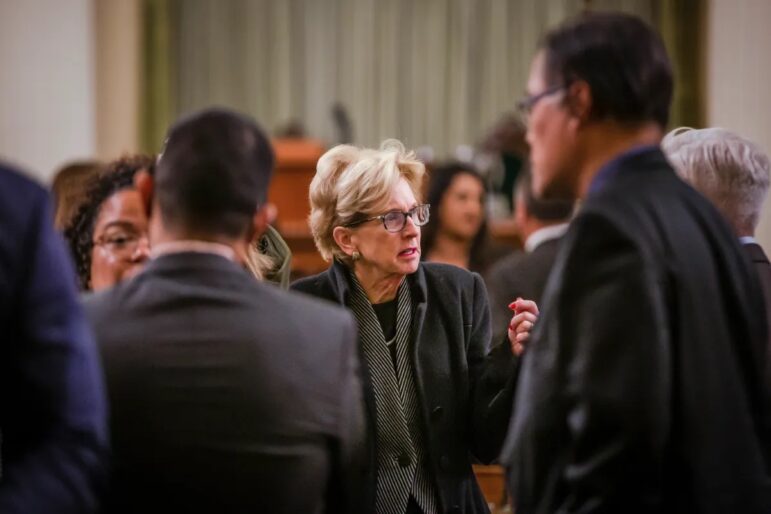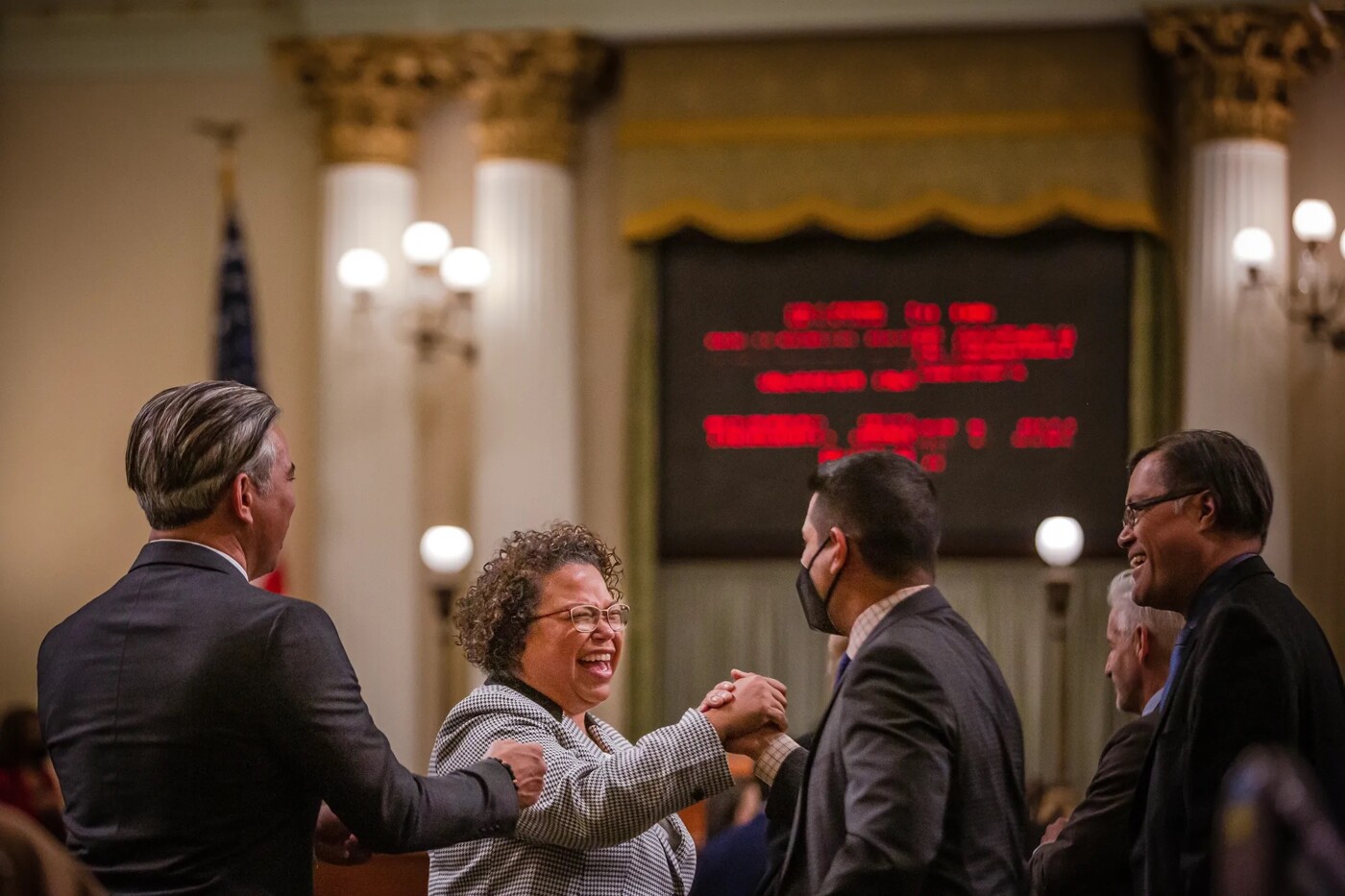A soaring homeless population. A bitter battle with the oil industry over gasoline prices. A spending plan for a state with the world’s fourth-largest economy as threats of a recession hover.
There’s a lot for the California Legislature to deal with this year — and it made little headway Wednesday, its first day back at the Capitol since swearing-in a new class of members last month. The brief floor sessions in the state Senate and Assembly focused more on the dearly departed than the challenges ahead.
The slow start to the legislative session is nothing new, but it does leave plenty of time for reflection. Here are some key questions for the year to come:
What will be the Legislature’s priorities?
By the afternoon, Senate and Assembly staff reported that just two new measures had been introduced in each house. (More than 140 were already submitted last month.) With a bill introduction deadline of Feb. 17, committee hearings and votes for most proposals are still months away.
So until then, floor sessions are mostly an opportunity for lawmakers to check in — and receive their per diem, the supplemental $214 paid daily to legislators for housing and living expenses, as long as they don’t leave Sacramento more than three days at a time.
The first floor sessions on Wednesday, for example, lasted about a half hour each in the Senate and Assembly, largely taken up by speeches memorializing friends and family who had died. Assemblymember Greg Wallis, a Bermuda Dunes Republican who won his seat by 85 votes, made his inaugural appearance on the floor; his race had not yet been called in time for the ceremonial swearing-in on Dec. 5.
In an interview, Assembly Speaker Anthony Rendon said housing issues would remain a central focus for the Legislature this session, including accountability for the billions of the dollars that California has spent on homelessness and development programs in recent years.
“Housing is the 10,000-pound gorilla that won’t go away,” the Lakewood Democrat said.
Rendon said he would also like to build on the momentum of a sweeping package of legislation passed last year to address climate change by tackling how transportation, the largest source of greenhouse gas emissions in California, contributes to the problem.
“Climate change is something we’ve been a leader on as a state,” he said. “We have to make sure we don’t fall behind again.”

How much impact will the budget deficit have?
Looming over the Legislature’s plans this year is the possibility of an economic downturn. Its fiscal and policy advisory office estimates a $24 billion budget deficit, and Gov. Gavin Newsom, who is set to unveil his preliminary spending plan next week, has also been urging caution for months.
Legislative leaders are projecting optimism about California’s ability to weather any revenue shortfalls, pointing to the tens of billions of dollars that now sit in state reserves. Sen. Nancy Skinner, a Berkeley Democrat who leads the Senate budget committee, said that while it may not be the time to create any more new programs, California’s finances are sound.
“With the type of surplus we had last year,” nearly $50 billion that was mostly directed to one-time expenditures over the next several years, Skinner said. “We have the space right now to make some adjustments to those if necessary.”
But if the economic picture grows gloomier in the months ahead, lawmakers may be forced to downsize their boldest policy ideas.
Sen. Susan Eggman, a Stockton Democrat, said this session was the right time to step back and examine whether new programs that the state has launched in recent years are working as intended.
“This session should be about a lot of oversight,” she said. “We still have ambitious packages, but we’re all very conscious of the price tags.”
What about the oil special session?
While Newsom continues to go after the oil industry — his office published a press release last week highlighting “Big Oil’s top lies” — there have been no significant developments on his “price gouging penalty” proposal since it was formally introduced a month ago.
The details of the penalty that Newsom wants to impose on oil companies for excessive profits, not to mention the special session in which the measure is being considered, remain elusive.
But Rendon said the Legislature still plans to take up the issue, even as gas prices fall, likely earlier in the year when there is more time to focus on it.
“Regardless of what happens with gas prices, it’s a good opportunity to ask the questions that we’ve been wanting to ask for a while of oil companies,” he said. “Their profits are staggering.”
How will diverse Legislature affect policy?
Having the most diverse Legislature in history doesn’t mean much without that representation translating into policy.
Some new lawmakers are already making attempts to do that.
Assemblymember Jasmeet Bains, a doctor and Democrat from Bakersfield, has introduced a bill that she says represents the concerns of her district: a task force to address fentanyl addiction in the Central Valley. That involves ensuring access to healthcare, addiction and rehabilitation services — and getting fentanyl off the streets, she said.
“I think the biggest reality that we see up in here in Sacramento is a failure of the Legislature to actively control our drug problem, our drug crisis,” she said. “In California, I don’t think very many people understand how bad the problem is, with exposure to things like fentanyl on the streets.”
Assemblymember Corey Jackson, the first openly gay Black legislator, said his top priorities include addressing mental health and continuing to learn lessons from the pandemic, such as the importance of childcare. The Democrat from the Riverside area introduced a bill to create an Affordable California Commission, tasked with tackling the state’s high cost of living.
“I come from a working class community. The 60th Assembly District are people who are just trying to survive every day,” he said. “And I wanted to send the message: ‘It is not okay just to survive. You deserve to thrive.’”
Jackson also plans to tackle what he expects will be a rise in racism and xenophobia ahead of the 2024 election.
“I intend to take an active role in rooting out racism, even in the very structures and even in the chambers of the state legislature itself,” he said. “Stay tuned, because there’s going to be a whole legislative package on anti-racism and systemic racism.”
Like Jackson, new state Sen. Caroline Menjivar also plans to address mental health. She has introduced a bill to prioritize more full-time counselors to Cal State campuses who can help the diverse student populations.
Public transportation and infrastructure are other key areas for her. She notes that in her San Fernando area district, it floods frequently — and typically in the areas where people of color live.
“A lot of what I speak to comes from lived experiences,” Menjivar said. “You know, when we talk about the lack of affordable housing, it’s my mom who has been on a waiting list for over five years, right. So these are issues that are personal to me.”
What’s happening with the recount?
While the November elections are largely a wrap, one seat remains contested: Democratic Sen. Melissa Hurtado’s Central Valley seat in District 16.
It was a close vote — the second closest legislative contest (based on percentages) in California history, said Alex Vassar, communications manager for the California State Library.
Hurtado, the incumbent, was sworn into office on Dec. 10 after eking out a 20-vote victory. Republican David Shepard formally requested a recount on Dec. 13.
That involves recounting ballots from Fresno, Kern, Kings and Tulare counties. Initial results from Fresno, Kern and Tulare counties showed Hurtado holding on to her seat: Shepard gained just two votes in Fresno County, two in Kings and three in Tulare.
After Shepard’s campaign requested a recount in about 20% of Kern County, Hurtado has now asked for a recount of some remaining portions. While a recount can be requested for just part of a county, a second recount can’t be requested for the same portions.
If Shepard were to pull off a win, though, it wouldn’t change anything Hurtado has done since being sworn in, Vassar said.
“She is a fully active seated member. All of her votes are being cast as a member,” he said. “Just like if someone were to resign — everything they’ve done still stands.”
